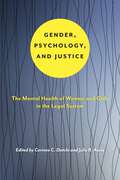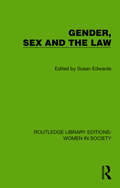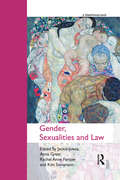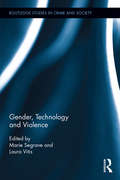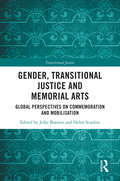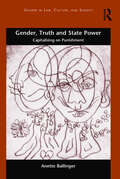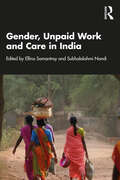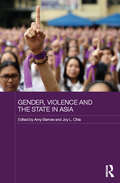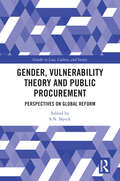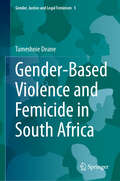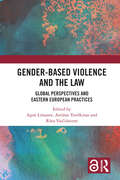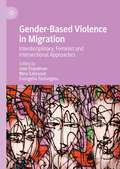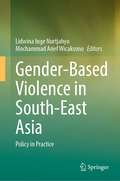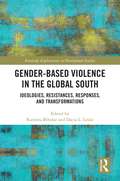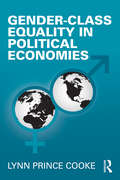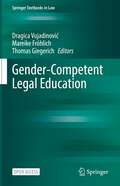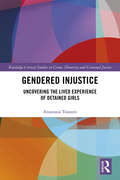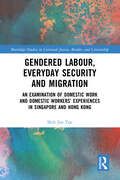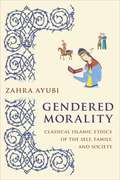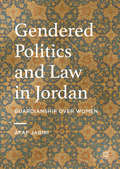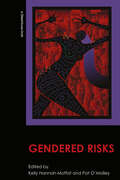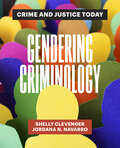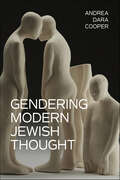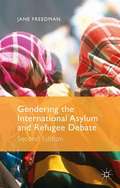- Table View
- List View
Gender, Psychology, and Justice: The Mental Health of Women and Girls in the Legal System (Psychology and Crime #6)
by Corinne Datchi Julie R AncisReveals how gender intersects with race, class, and sexual orientation in ways that impact the legal status and well-being of women and girls in the justice system. Women and girls’ contact with the justice system is often influenced by gender-related assumptions and stereotypes. The justice practices of the past 40 years have been largely based on conceptual principles and assumptions—including personal theories about gender—more than scientific evidence about what works to address the specific needs of women and girls in the justice system. Because of this, women and girls have limited access to equitable justice and are increasingly caught up in outdated and harmful practices, including the net of the criminal justice system. Gender, Psychology, and Justice uses psychological research to examine the experiences of women and girls involved in the justice system. Their experiences, from initial contact with justice and court officials, demonstrate how gender intersects with race, class, and sexual orientation to impact legal status and well-being. The volume also explains the role psychology can play in shaping legal policy, ranging from the areas of corrections to family court and drug court. Gender, Psychology, and Justice provides a critical analysis of girls’ and women’s experiences in the justice system. It reveals the practical implications of training and interventions grounded in psychological research, and suggests new principles for working with women and girls in legal settings.
Gender, Sex and the Law (Routledge Library Editions: Women in Society)
by Susan EdwardsOriginally published in 1985 Gender, Sex and the Law explores the way in which the law, at its various levels of jurisdiction, justifies its discrimination against women in terms of the physiological differences between the sexes. The book examines the wider and most pervasive consequences of this as it affects women in their legal status, their rights, obligations and duties and in their confrontation with the law. Whilst it focuses principally on the contemporary implications of this legal perception in the sphere of crime, work and medical practice, there is also discussion of the historical development of these attitudes. The book has appeal across subject boundaries, it sets out what was bothering feminists lawyers and activists in the 1980s, matters still bothering us today.This book is a re-issue originally published in 1985. The language used and views portrayed are a reflection of its era and no offence is meant by the Publishers to any reader by this re-publication.
Gender, Sexualities and Law
by Kim Stevenson Jackie Jones Anna Grear Rachel Anne FentonBringing together an international range of academics, Gender, Sexualities and Law provides a comprehensive interrogation of the range of contemporary issues – both topical and controversial – raised by the gendered character of law, legal discourse and institutions. The gendering of law, persons and the legal profession, along with the gender bias of legal outcomes, has been a fractious, but fertile, focus of reflection. It has, moreover, been an important site of political struggle. This collection of essays offers an unrivalled examination of its various contemporary dimensions, focusing on: issues of theory and representation; violence, both national and international; reproduction and parenting; and partnership, sexuality, marriage and the family. Gender, Sexualities and Law will be invaluable for all those engaged in research and study of the law (and related fields) as a form of gendered power.
Gender, Technology and Violence (Routledge Studies in Crime and Society)
by Marie Segrave Laura VitisTechnological developments move at lightening pace and can bring with them new possibilities for social harm. This book brings together original empirical and theoretical work examining how digital technologies both create and sustain various forms of gendered violence and provide platforms for resistance and criminal justice intervention. This edited collection is organised around two key themes of facilitation and resistance, with an emphasis through the whole collection on the development of a gendered interrogation of contemporary practices of technologically-enabled or enhanced practices of violence. Addressing a broad range of criminological issues such as intimate partner violence, rape and sexual assault, online sexual harassment, gendered political violence, online culture, cyberbullying, and human trafficking, and including a critical examination of the broader issue of feminist ‘digilantism’ and resistance to online sexual harassment, this book examines the ways in which new and emerging technologies facilitate new platforms for gendered violence as well as offering both formal and informal opportunities to prevent and/or respond to gendered violence.
Gender, Transitional Justice and Memorial Arts: Global Perspectives on Commemoration and Mobilization
by Jelke Boesten and Helen ScanlonThis book examines the role of post-conflict memorial arts in bringing about gender justice in transitional societies. Art and post-violence memorialisation are currently widely debated. Scholars of human rights and of commemorative arts discuss the aesthetics and politics not only of sites of commemoration, but of literature, poetry, visual arts and increasingly, film and comics. Art, memory and activism are also increasingly intertwined. But within the literature around post-conflict transitional justice and critical human rights studies, there is little questioning about what memorial arts do for gender justice, how women and men are included and represented, and how this intertwines with other questions of identity and representation, such as race and ethnicity. The book brings together research from scholars around the world who are interested in the gendered dimensions of memory-making in transitional societies. Addressing a global range of cases, including genocide, authoritarianism, civil war, electoral violence and apartheid, they consider not only the gendered commemoration of past violence, but also the possibility of producing counter-narratives that unsettle and challenge established stereotypes. Aimed at those interested in the fields of transitional justice, memory studies, post-conflict peacebuilding, human rights and gender studies, this book will appeal to academics, researchers and practitioners.
Gender, Truth and State Power: Capitalising on Punishment (Gender in Law, Culture, and Society)
by Anette BallingerThis book is concerned with critically analysing the importance of the status of knowledge in establishing ‘truth’ about female defendants convicted of murder during the 20th Century. While the abolition of the death penalty in the UK has insured that the impact of this knowledge is no longer one of life and death, modern cases such as that of Sally Clark, whose guilty verdict was eventually overturned, nevertheless demonstrate the devastating impact that those with the power to define the 'truth' still have on the lives of individuals who are unable to construct a dominant truth of their own during their trials. Using the key themes of truth, gender and power, the book also focuses on agency and rationality in relation to female criminality, masculinity and miscarriages of justice. Challenging official discourse which historically has incorporated entrenched constructions of women who kill as mad, bad or tragic victims, this book argues for the creation of new subject positions and alternative discourses within which female violence can be understood.
Gender, Unpaid Work and Care in India
by Ellina Samantroy and Subhalakshmi NandiThis book explores the paradox of women’s paid and unpaid work in India. It examines key themes including historical discourses, macroeconomic policies, employment trends, issues of tribal areas, public services and infrastructure, climate change and gendered migration and vulnerability of girl children. It highlights the play of gender norms, resource rights, identities and agency in women’s work. Building on feminist theoretical frameworks and empirical analyses from microstudies, the volume offers fresh perspectives for research and policy on women’s work in the Global South. A timely intervention, this multidisciplinary book will be useful to scholars and researchers of political economy, labour studies, women’s/gender studies, public policy, economics, development studies, sociology, South Asian studies and Global South studies. It will interest planners, policymakers, gender advocates, civil society organisations, human rights bodies and international organisations working towards ensuring gender equality and women’s rights.
Gender, Violence and the State in Asia (Routledge Research on Gender in Asia Series)
by Amy Barrow and Joy L. ChiaWhile gender-based violence occurs in all societies irrespective of the level of development or cultural setting, whether in conflict or peacetime, the challenges for legal responses to gender-based violence are particularly acute in Asia. This book addresses the lack of academic discourse on gender-based violence in Asia beyond domestic violence, by demonstrating that gendered violence exists within many different contexts and is perpetuated by multiple actors. Bringing together scholars, legal practitioners and human rights advocates, the book examines the intersections between gender, violence and the state in Asian contexts. It considers the role of state institutions in perpetuating and preventing violence based on gender and identity, and thus contributes to growing scholarship around due diligence standards under international law. Analyzing both physical and structural gender-based violence, it scrutinizes how such violence exists within a landscape shaped by distinct cultural norms, laws and policies, and grapples with how to practically translate international human rights standards about state responsibility into these complex domestic environments. Contributors from diverse backgrounds draw on case studies and empirical research to ground this academic scholarship in lived experiences of individuals and their communities in Asia. By bridging the divide between policy, laws and practice to offer a unique insight into both theoretical and practical responses to how gender-based violence is understood within communities and state institutions in Asian countries, this book will appeal to students and scholars of Asian studies, Gender Studies and Law.
Gender, Vulnerability Theory and Public Procurement: Perspectives on Global Reform (Gender in Law, Culture, and Society)
by S. N. NyeckTaking up the concept of vulnerability, this book examines the gendered impact of market-based procurement practices. In recent years, ideological shifts and real managerial constraints have forced states everywhere to rely on private resources to solve public problems. Focusing on instances where the state retains ownership of assets and rights, even if it temporarily devolves its authority to a private entity (profit or non-profit), this book uncovers the ways in which these private actors are not just suppliers of materials goods, but increasingly policy influencers. More specifically, the book focuses on the gendered dynamics within the law, policy, and practice of public procurement and investigates how vulnerability is conceptualized and coded in the process of public acquisition of works, goods, and services from private suppliers. In this book, a series of rich case studies from Africa, the Middle East, and Europe show how vulnerability theory can inform the design of public institutions that are more responsible and responsive to gender-informed demands for social justice. This first book to integrate vulnerability theory into public procurement studies in global and comparative perspectives will appeal to scholars and others with interests in gendered dynamics in law and society, international development, public policy, and international political economy.
Gender-Based Violence and Femicide in South Africa (Gender, Justice and Legal Feminism #5)
by Tameshnie DeaneThis book presents new perspectives on gender-based violence (GBV) in South Africa. It argues that violence against women is a manifestation of unequal gender relations and harmful manifestations of hegemonic masculinity, which are governed by patriarchal beliefs, institutions and systems. It includes chapters on quantitative research that assess not only the levels and determinants of violence against women but also men’s attitudes towards gender-based violence, perceptions of violence, the legislative frameworks governing violence against women in South Africa, and the current cases and jurisprudence relating to this scourge. In spite of its focus on South Africa, the book also provides insights for comparative scholars exploring the value of different constitutional articulations of human rights and how they support (or fail to support) efforts to combat violence against women. By assessing recent incidents and responses to gender-based violence, the book provides a view of not only the societal but also jurisprudential opportunities and pitfalls in this area that may be applicable elsewhere. Gender equality and, central to this, the right of women to live lives free of violence, is a precondition for full democratic participation and is a universal goal. Accordingly, the South African experience contributes to a wider understanding of the possibilities and limitations of societal and legal reform in challenging the ubiquity of violence against women. The book is aimed at researchers, practitioners, students, professionals and advocates in the field of gender-based violence.
Gender-Based Violence and the Law: Global Perspectives and Eastern European Practices
by Agnė Limantė Artūras Tereškinas Rūta VaičiūnienėThis book presents a novel and insightful examination of gender-based violence, inviting readers to consider this topic from various perspectives. It encompasses various conceptual discussions and international regulations and trends, while concurrently emphasising the legal regulations and practices of select Central and Eastern European countries. Significantly underrepresented in legal scholarship, this region has been overlooked and subject to limited comprehensive analyses. The authors address different aspects of gender-based violence, also covering some areas that have received little attention in academic literature, such as gender-based violence in academia and cyberstalking. Furthermore, the book incorporates recent empirical studies, thereby endowing readers with valuable insights into the specific challenges encountered in the region. By contributing to current research on gender-based violence in Europe, this publication is an invaluable resource for researchers, students, policymakers, and general readers interested in gender-based violence and the fight against it in the Central and Eastern European region.
Gender-Based Violence and the Law: Global Perspectives and Eastern European Practices
by Agnė Limantė Artūras Tereškinas Rūta VaičiūnienėThis book presents a novel and insightful examination of gender-based violence, inviting readers to consider this topic from various perspectives. It encompasses various conceptual discussions and international regulations and trends, while concurrently emphasising the legal regulations and practices of select Central and Eastern European countries. Significantly underrepresented in legal scholarship, this region has been overlooked and subject to limited comprehensive analyses. The authors address different aspects of gender-based violence, also covering some areas that have received little attention in academic literature, such as gender-based violence in academia and cyberstalking. Furthermore, the book incorporates recent empirical studies, thereby endowing readers with valuable insights into the specific challenges encountered in the region. By contributing to current research on gender-based violence in Europe, this publication is an invaluable resource for researchers, students, policymakers, and general readers interested in gender-based violence and the fight against it in the Central and Eastern European region.
Gender-Based Violence in Migration: Interdisciplinary, Feminist and Intersectional Approaches
by Jane Freedman Nina Sahraoui Evangelia TastsoglouWith contributions from a diverse array of international scholars, this edited volume offers a renewed understanding of gender-based violence (GBV) by examining its social and political dimensions in migration contexts. This book engages micro, meso, and macro levels of analysis by foregrounding a conceptualization of GBV that addresses both its interpersonal and structural causes. Chapters explore how GBV frameworks and migration management intersect, bringing to the forefront the specific inequalities these intersections produce for migrant women. Drawing upon several disciplines, the authors engage in co-writing a critical engagement which proposes an original understanding of how the concepts of intersectionality, vulnerability and precarity speak to each other from a feminist perspective. This volume will be of interest to scholars/researchers and policymakers in Gender Studies, Migration and Refugee Studies, Sociology, Political Science, Trauma Studies, Human Rights and Socio-Legal Studies.
Gender-Based Violence in South-East Asia: Policy in Practice
by Lidwina Inge Nurtjahyo Mochammad Arief WicaksonoThis book presents new research on gender-based violence in Southeast Asia, bringing together varied scholarly work in law, policy, and practice. It enables a greater understanding of violence against women as an international concern, highlighting particular issues that arise in the region. Against a background of international obligations to ensure women's rights through laws and policies that are geared at ending violence against women and girls, this research documents the state failures, individual shame and fear, and societal culture that collectively affects the reporting, investigation, prosecution of perpetrators, and protection of victims. The research explores differing legal mechanisms both internationally, and within nation states, relating to cases of physical and sexual violence. It recognizes the need for functioning mechanisms to ensure women can report their cases safely and be provided with protective and therapeutic services in a way that is systematic, effective, and measurable. Laws and court decisions are analyzed, crisis and safety centers are examined, and in-depth interviews are conducted with actors and NGOs with relevant roles and functions in the mechanism of cases of violence against women. The result is a comprehensive assessment of the incalculable harm it does within Southeast Asian society, and the obstacles it presents for law enforcement. The chapters uncover mechanisms with unique characteristics across Southeast Asia, providing a nuanced understanding of the cultural and social backgrounds, as well as the religious structures, that can both help and hinder suitable frameworks. It is relevant to scholars, policymakers, and practitioners in law, criminology, and gender sociology.“This is a valuable contribution towards empowering the women of South East Asia out of victimhood to valued equality, involvement in governance and leadership through the elimination of violence and discrimination and an excellent resource not just for those working in this field but for those involved in law making, the media and the people of South East Asia.”- Professor Felicity Gerry QC, Barrister at Crockett Chambers Melbourne and Libertas Chambers, London, and Professor of Legal Practice at Deakin University and Honorary Professor at Salford University.
Gender-Based Violence in the Global South: Ideologies, Resistances, Responses, and Transformations (Routledge Explorations in Development Studies)
by Dacia L. LeslieThis book amplifies the different voices and experiences of those facing gender-based violence (GBV) in the Global South. It explores the localised ways in which marginalised individuals design modes of coping with and address GBV, including cultural interpretations, and artistic and faith-based expressions.The book examines GBV triggers, prevalence, and societal impacts while referring to community, national, and regional mobilisation to deal with the phenomenon in its various manifestations, including physical, psychological, political, domestic, and public violence. It explores issues related to women’s negotiations with the patriarchal underpinnings of GBV; the role of the law and history in the perpetuation of GBV; the complementary role of culture and faith to legal protection against GBV, and access to justice for women and girls. In doing so, the book exposes understandings and expressions of GBV, as well as methodologies and indigenous initiatives to prevent it through local viable solutions. The book thus challenges the normalisation of GBV in the Global South.Providing concrete and culturally relevant suggestions for challenging ingrained models of gender understandings of violence in the Global South, this book will be of interest to academics in the fields of Development Studies, Gender Studies, Women’s Studies, Violence and Abuse Studies, Human Rights, Criminal Law, and Socio-Legal Studies.
Gender-Class Equality in Political Economies (Perspectives on Gender)
by Lynn Prince CookeGender-Class Equality in Political Economies offers an in-depth analysis of gender-class equality across six countries to reveal why gender-class equality in paid and unpaid work remains elusive, and what more policy might do to achieve better social and economic outcomes. This book is the first to meld cross-time with cross-country comparisons, link macro structures to micro behavior, and connect class with gender dynamics to yield fresh insights into where we are on the road to gender equality, why it varies across industrialized countries, and the barriers to further progress.
Gender-Competent Legal Education (Springer Textbooks in Law)
by Thomas Giegerich Dragica Vujadinović Mareike FröhlichMale-dominated law and legal knowledge essentially characterized the whole of pre-modern history in that the patriarchy represented the axis of social relations in both the private and public spheres. Indeed, modern and even contemporary law still have embedded elements of patriarchal heritage, even in the secular modern legal systems of Western developed countries, either within the content of legislation or in terms of its implementation and interpretation. This is true to a greater or lesser extent across legal systems, although the secular modern legal systems of the Western developed countries have made great advances in terms of gender equality. The traditional understanding of law has always been self-evidently dominated by men, but modern law and its understanding have also been more or less “malestreamed.” Therefore, it has become necessary to overcome the given “maskulinity” of legal thought. In contemporary legal and political orders, gender mainstreaming of law has been of the utmost importance for overcoming deeply and persistently embedded power relations and gender-based, unequal social relations. At the same time and equally importantly, the gender mainstreaming of legal education – to which this book aims to contribute – can help to gradually eliminate this male dominance and accompanying power relations from legal education and higher education as a whole. This open access textbook provides an overview of gender issues in all areas of law, including sociological, historical and methodological issues. Written for students and teachers around the globe, it is intended to provide both a general overview and in-depth knowledge in the individual areas of law. Relevant court decisions and case studies are supplied throughout the book.
Gendered Injustice: Uncovering the Lived Experience of Detained Girls
by Anastasia TosouniWithout strong proof, policy advocates along with some scholars have causally linked declines in juvenile offending and incarceration with evidence-based and rehabilitation-oriented policy reform. Such studies have called for a shift back to rehabilitative ideals augmented by innovative strategies that emphasize cultures of care, and in the cases of system-involved girls, ‘gender-responsive’ programs, anchored in feminist literature. These programs have also caught the attention of feminist scholars who cast doubt on both their design and implementation. Gendered Injustice offers a unique contribution to the latter line of scholarship, and critically examines claims of innovation, empowerment, and gender-responsivity in youth correction that currently dominate the field. Drawing on rich ethnographic data, this book uncovers the reality of, and gives voice to, the experiences and continued mistreatment of marginalized girls housed in locked institutions in the US State of California. By providing detailed insight into the detention experiences and the pathways of several young women, this book draws stark comparisons between the lived experience of young women in detention with the official rhetoric of empowerment that dominates public discourse. This book reveals the ways in which institutional policies and practices are designed to neglect and, in many instances, re-victimize inmates. This is essential reading for those engaged in corrections, juvenile justice, gender and crime, and feminist criminology.
Gendered Labour, Everyday Security and Migration: An Examination of Domestic Work and Domestic Workers’ Experiences in Singapore and Hong Kong (Routledge Studies in Criminal Justice, Borders and Citizenship)
by Shih Joo TanDrawing on original empirical research from Singapore and Hong Kong, Gendered Labour, Everyday Security and Migration interrogates women migrant domestic workers’ experiences of work and workplace exploitation. It examines the ways in which these women negotiate everyday security and safe work against the backdrop of affective employment relations and institutional structures of labour and migration law. It challenges the current emphasis on the language of exploitation and legal approaches to identifying, understanding and rectifying poor employment conditions for women migrant domestic workers. This book addresses the limited research literature that examines the extent to which regulatory or criminal justice responses are relevant to, and utilised by, women migrant domestic workers in their everyday negotiation of safe work and offers a unique contribution to the field. An accessible and compelling read, it will be of interest to researchers from across the fields of criminology, sociology, labour migration studies and women’s studies.
Gendered Morality: Classical Islamic Ethics of the Self, Family, and Society
by Zahra M. AyubiIslamic scriptural sources offer potentially radical notions of equality. Yet medieval Islamic philosophers chose to establish a hierarchical, male-centered virtue ethics. In Gendered Morality, Zahra Ayubi rethinks the tradition of Islamic philosophical ethics from a feminist critical perspective. She calls for a philosophical turn in the study of gender in Islam based on resources for gender equality that are unlocked by feminist engagement with the Islamic ethical tradition.Developing a lens for a feminist philosophy of Islam, Ayubi analyzes constructions of masculinity, femininity, and gender relations in classic works of philosophical ethics. In close readings of foundational texts by Abu Hamid Muhammad al-Ghazali, Nasir-ad Din Tusi, and Jalal ad-Din Davani, she interrogates how these thinkers conceive of the ethical human being as an elite male within a hierarchical cosmology built on the exclusion of women and nonelites. Yet in the course of prescribing ethical behavior, the ethicists speak of complex gendered and human relations that contradict their hierarchies. Their metaphysical premises about the nature of the divine, humanity, and moral responsibility indicate a potential egalitarian core. Gendered Morality offers a vital and disruptive new perspective on patriarchal Islamic ethics and metaphysics, showing the ways in which the philosophical tradition can support the aims of gender justice and human flourishing.
Gendered Politics and Law in Jordan
by Afaf JabiriThis book analyzes how the state constructs and reproduces gender identities in the context and geopolitics of Jordan. It addresses the relevance of the state and its web of relations in understanding the politics of gender in the Middle East, rather than a cultural or religious explanation for women's subjugation. Guardianship over women is examined as not only the basis of women's legal and social subordination, but also a key factor in the construction and reproduction of a gender hierarchy system. The author probes how a masculine state gives power and legitimacy through guardianship to institutions-including family, religion, and tribe-in managing, producing, and constructing gender identity. Does the masculine institution succeed in imposing a dominant form of femininity? Or are there ways by which women escape and resist the social and legal construction of femininity? Based on over 60 case studies of contemporary women in Jordan, the book additionally examines how the resultant strategies and tactics developed by women in Jordan are influenced by and affect their status within the guardianship system.
Gendered Risks
by Pat O'Malley Kelly Hannah-MoffatEdited and contributed to by a collection of eminent international scholars in the field, this is the first book to explore the gendered aspects of risk. It analyzes what is currently known and identifies some of the new directions and challenges for research and theory that emerge from thinking of risk as a governmental technique; as a form of consciousness and action and as a political issue, shaped by, and shaping gender in contemporary society.
Gendering Criminology: Crime and Justice Today
by Shelly Clevenger Jordana N. NavarroGendering Criminology provides a contemporary guide for understanding the role of gender in criminal engagement and experiences as well as reactions to these offenses among laypersons and agents of social control. The textbook provides evidence for the argument that gender socially situates people in their risks for criminal engagement, victimization, and what occurs in the aftermath of crime: arrest, the judicial process, and sentencing. Aside from investigating the role of men and women, the authors also explore the experiences of LGBTQIA+ communities involved in or working within the criminal-legal system. The volume provides a comprehensive account of various offenses—violent and nonviolent—and individual motivations, drives, and methods, to help students develop the skills they need to work as professionals in and around the criminal-legal system. Key features: Applies theoretical concepts to real-life applications, media bytes, and case studiesIncludes new and timely information regarding gender and online victimizationProvides an overview of each topic within eleven chapters, delving into the literature in each areaPromotes active learning activities in each chapter to fully immerse and engage students in the material
Gendering Modern Jewish Thought (New Jewish Philosophy and Thought)
by Andrea Dara CooperThe idea of brotherhood has been an important philosophical concept for understanding community, equality, and justice. In Gendering Modern Jewish Thought, Andrea Dara Cooper offers a gendered reading that challenges the key figures of the all-male fraternity of twentieth-century Jewish philosophy to open up to the feminine.Cooper offers a feminist lens, which when applied to thinkers such as Franz Rosenzweig and Emmanuel Levinas, reveals new ways of illuminating questions of relational ethics, embodiment, politics, and positionality. She shows that patriarchal kinship as models of erotic love, brotherhood, and paternity are not accidental in Jewish philosophy, but serve as norms that have excluded women and non-normative individuals.Gendering Modern Jewish Thought suggests these fraternal models do real damage and must be brought to account in more broadly humanistic frameworks. For Cooper, a more responsible and ethical reading of Jewish philosophy comes forward when it is opened to the voices of mothers, sisters, and daughters.
Gendering the International Asylum and Refugee Debate
by Jane FreedmanThis study provides a comprehensive account of the situation of women refugees globally and explains how they differ from men. It looks at causes of refugee flows, international laws and conventions and their application, the policies and legislation of Western governments, and lived experiences of the refugees themselves.
